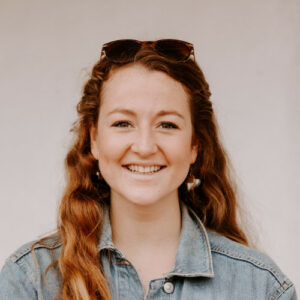Social Impact is at the core of the Zena Brand says Caragh Bennet, founder of the women-focused cult brand

Founder of the Zena Brand, Caragh Bennet, joined us for a virtual discussion of the brand’s ethos, its mission and how to empower the next generation of female entrepreneurs. MA student Christian Valdez reports…
Fun, sparkly and socially responsible, these words describe the Zena brand. Produced using locally sourced cruelty-free materials such as cattle horn (a by-product of the meat industry) and characterised by a colourful palette and playful shapes, the brand has caught the attention of young women and celebrities such as Lizzo, who endorsed the brand via Instagram, and Gemma Styles who wore Zena during the GQ Heroes 2021 event at Soho Farmhouse. The Zena brand has also been featured in prestigious titles such as Vogue Italia, Marie Claire and Harper’s Bazaar. However, behind this fun and affordable jewellery brand are women with big dreams and aspirations.

Zena Brand Empowers Women to Become Entrepreneurs
Founded by Caragh Bennet and Loren Thomas, the brand’s mission through The Zena Launchpad programme is to empower future female entrepreneurs in rural Uganda. Giving them the opportunity to get out of poverty, reinvent themselves and support their goals and loved ones. What makes Zena unique is that it is part non-profit organisation where they work with donors who support their mission, and part social enterprise where the enrolled women can earn capital for their business ideas.

Addressing Gender Inequality
According to Caragh, women in Uganda suffer great gender inequality, have limited access to education and are under-represented in politics. Through the brand’s programme there is no dependency, handouts or debt; meaning women are not given loans or a sum of money to blindly launch their businesses. Instead, selected women who are enrolled in the programme receive and gain the education and skillset they need to mould them into independent future business owners.
Building a Community to Help Women Realise Their Vision
Most importantly, they gain a sense of community as well as the opportunity for apprenticeship to develop and produce jewellery for The Zena Brand, while earning enough to live and save for their future. In fact, 40% of their earnings go towards a decent living wage and the rest is saved for their future businesses. Towards the end of the programme, these women graduate as entrepreneurs equipped with the experience, practical training and education they needed in order to realise their visions.
Last week, co-founder Cara was invited to talk to the Condé Nast students about her journey in Uganda as a student at Oxford University, the origins of Zena and experiences where she had to demonstrate resilience and strong leadership skills. Moreover, she shared nine things she wished she knew before being an entrepreneur.

So far, Zena has supported 40 women entrepreneurs where 86% of the businesses that launched still operate after two years. As a result, 200 lives are out of poverty, and 95 children are receiving the education they deserve. This impact alone is keeping the founders inspired to expand geographically and beyond producing jewellery. Hopefully, its ongoing success will be replicated on a wider scale not just to support women in Uganda, but people who need support to get out of poverty.
As we had time to reflect on our values and consumption practices over the lockdown period, it is important to support businesses like Zena knowing that purchasing even a small thing like a pair of earrings can make a huge impact to a woman’s life in Uganda.
Key Take Aways:
- Business owners do not get the green light from other people but themselves. Be a self-starter.
- Know your “WHY”
- Do things to scale your business
- Know the value of having a team
- Get used to risks
- There is enough money in the world
- Celebrate the wins
- Leave the only female spaces
- Take the next best “yes”